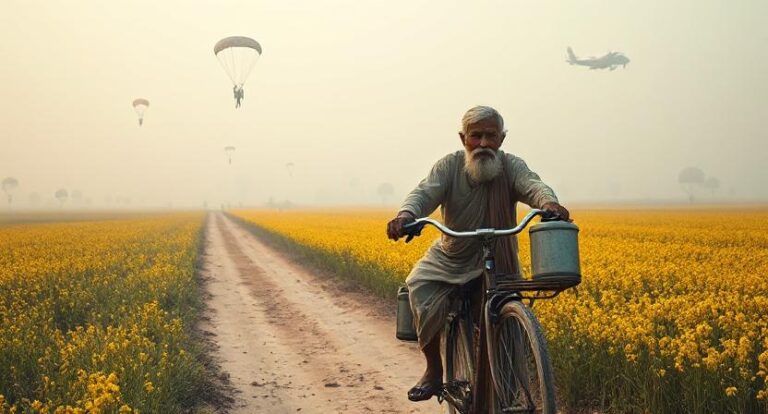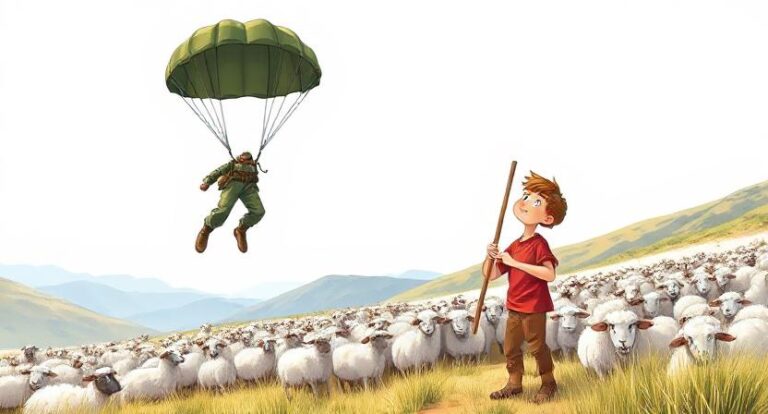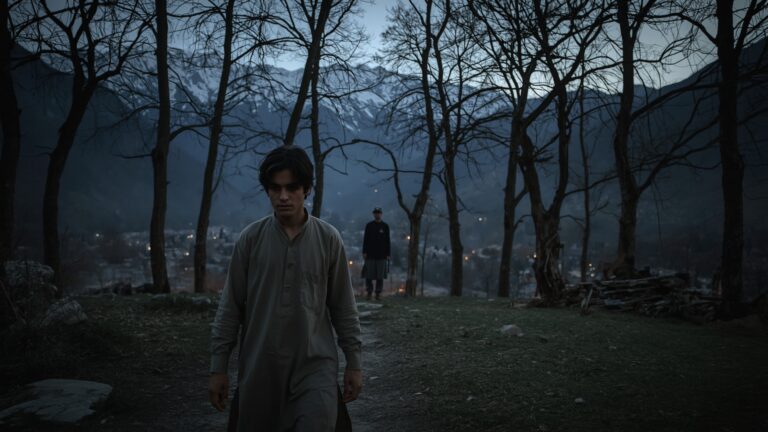
The sun, a subdued orange ball, sank fast behind the Gagal ridge. In a matter of minutes, another day would end in the Kashmir Valley.
A black veil slowly covered the land. The mountain behind rose up to nearly 3,000 metres [10,000 feet] and the Khobalmarghi top was now covered with a thin line of clouds. Thunder rumbled across the valley and forked lightning lit up the Lolab Valley intermittently. Rain was imminent. The sounds of insects and birds rose in unison to a crescendo. To those who knew the jungle, it was the last cry of the wild before silence descended with the night.
Major Sudhir Kumar looked up at the gloomy sky, then toward the village below. It had been one of those futile operations when hours were spent waiting in the bushes. For men who had been out in the wilderness for the past 48 hours, the comforts of a house and a hot cup of tea were difficult to resist. The Major looked back at his tired, hungry men and made up his mind. “Balbir,” he said, calling the lead scout. “Let’s take a break down in the village and wait for the vehicles.” Selecting a big house at the village’s periphery, they made themselves comfortable. There was a biting wind blowing across the valley, chilling the men. The Major selected a corner next to a blazing hearth, stretching out with his heavy pack as a pillow. The tension and fatigue of the past two days swept over him like a giant wave.
But excited chattering in Kashmiri from the next room disturbed him. He opened his eyes and told one of the men to see what was happening. A 10-year-old boy was ushered into the room. The boy was sobbing, his firan1 and boots covered in mud. “What’s the matter, boy?” asked Sudhir. A woman behind answered. “Jenab2, his father is very sick. They have no money to treat him. He is trying to collect money from the villagers.”
“What’s your name, boy?” asked the Major. “Amir,” he said, wiping the tears with the backs of his sleeves. “How much do you want?” “A hundred rupees, for Abba’s treatment in the clinic in Kupwara,” said Amir. “And how do you plan to take him there?” asked Sudhir. “I don’t know. Nobody would like to move at this time of the night and if he doesn’t get medical attention now, he will die by morning.”
Sudhir summoned the troop sergeant, instructing him to give cash to the boy. A few men were further detailed to carry the old man to the vehicle, when it arrived. “Amir,*’ he said, turning to the boy. “I am going that way, and we’ll give you a lift.” They left Amir and his father at one of the local hakims3 in town. “Treat him well,” Sudhir told the doctor. “I’ll come and check tomorrow. Don’t worry,” he said, turning to Amir and tousling his dirty hair. “He’ll be all right.””How should I return the money I have borrowed?” the boy asked. “Forget it.” Sudhir said, smiling. As an afterthought, he pulled the boy aside and added, “If you have any information about militants, that’s where I stay,” he said, pointing at some dilapidated Army barracks down the road. “My name is Major Sudhir. You’ll remember that, won’t you?”
Not long after meeting Amir, life settled into a pattern familiar to soldiers in insurgent areas: Eat, sleep, operations, with a constant hope of leave. Many months later, Sudhir was relaxing in his room when a sentry walked in. “Sahib, there’s a little boy at the gate. Says his name is Amir. Knows your name and is insisting to meet you regarding something important.” “Send him in,” said the Major.
Sudhir sized up the little boy in a grey firan with a handsome face. The boy saw Sudhir didn’t recognize him. “Sir… A few months ago, you gave me money to treat my father…” “Oh, yes!” The Major’s face lit up. “How’s your father now?” “Allah has spared him, jenab.” “Have you come to return the money? I had told you to forget it,” said the Major. “No jenab,” said Amir. “You had asked me to come to you if I had any information on militants. I am here to give you that.” The Major pulled up a chair and told Amir to sit. “Where, when and how many?” he asked.
Amir paused, as if collecting his thoughts. His gaze fell on the crackling bukhari at his feet. Sudhir knew the boy was fighting his emotions. He needed help in parting with the information. “You needn’t worry. Amir,” Sudhir said. “No one will know you gave the information. And if you are feeling guilty, forget the guilt. You are ridding the country of vermin. Maybe when you grow up, we can get you a job in the Army.”
The boy took a deep breath and answered slowly. “One man, he’s at my house. If you can come quietly and before dark, you may get him.”
Sudhir didn’t press the boy for more information. He had shown courage for his age, coming all the way from his village to an Army post. The Major stood up and crossed the room to a map hanging on the wall. He ran his eyes over it more out of habit than for information; he knew the area like the back of his hand. Soon, orders were being passed down to the men’s quarters, and a fighting patrol was ready within minutes. Sudhir addressed the men. “From here to the ziarat4 in vehicles,” he said. “I’ll get off with 10 men. The rest continue to Charkoot. Stay on the radio if I need reserves. My party will skirt the village till we reach the house. Remember: Speed and surprise are essential. Any doubts or questions?” There were none. Each man knew his role. The Major watched like a worried father as his men broke out in the field outside the village, preparing for action. This was the crucial stage where surprise could be lost. A while later, Sudhir looked at his men in position around the house, a satisfied smile played on his lips. They were good, he thought. They were his boys after all.
The house was small compared to the neighbour’s. If its size was a reflection of the family’s affluence, it made sense they didn’t have 100 rupees to treat the father. He imagined the militant sitting around, ordering the family members for food and money.
A local was summoned and sent into the house with a message for the militant to surrender. The answer came back: No surrender. A brief pause for the civilians to exit, and the firefight commenced.
The odds were stacked against the man holed up inside. A grenade through the window finished it quickly. His death got him jannat. It got Major Sudhir Kumar and his troop another kill. And as Sudhir thought, it was one less to fight for Jehad-e-Kashmir. As the militant’s blood-soaked body was pulled out of the house, a soulful, piercing wail rose up from the villagers. Sudhir had heard it before and it always sent a shiver up his spine. He knew immediately that the dead man was a local. As a mark of respect he saluted the corpse. The words from a poem he knew came to him. “No sight better below the blue sky then to see how bravely a man can die.”
The Major turned and gave one last look at the house and the surroundings, memorising the details of the incident for debriefing later. Gradually the onlookers drifted back to their houses. Under the shadows of a walnut tree, Sudhir saw Amir. He stood next to an old man, holding his hand. Glancing around to ensure that nobody was watching, Sudhir approached them.
“Your father, Amir, I presume,” said the Major. “Looks fine now. Well done, boy, that was man’s work and it takes courage to do what you did.” Sudhir took a couple of 100 Rupee notes from his pocket, crumpled them into a ball and extended his hand toward Amir, saying, “Innam, for what you did, and if you drop in at the post tomorrow, I’ll buy you a tape recorder from the canteen.” “Shukria6,” said Amir in a quivering voice, “I didn’t do it for the money.” That’s when Sudhir noticed that both the father and his son were crying. “You saved my father’s life,” said Amir. “In return I gave you something which you hold precious as a soldier: The life of another man. You owe me nothing. For what price in the world huzoor, can you pay me for killing my only brother? Remember us in your prayers. Khudha hafiz.” The old man and the boy turned around and, still holding hands in their grief, walked back up the hill. With a lump in his throat, Sudhir watched them go until they disappeared into the darkness.
This story was told to me by Major Sudhir Kumar Walia, a day prior to his departure for the Kargil conflict in 1999. That was the last time he was seen south of the Banihal Pass as he was killed trying to hit a militant camp in North Kashmir. Whenever I think of him, I am reminded of these lines from a poem by Kipling:
“A scrimmage in a border station – A canter down some dark defile – Two Thousand pounds of education – Drops to a ten-rupee jezail.”
This story was part of the Borderlands section of The Outdoor Journal Summer 2013 edition of the print magazine.



